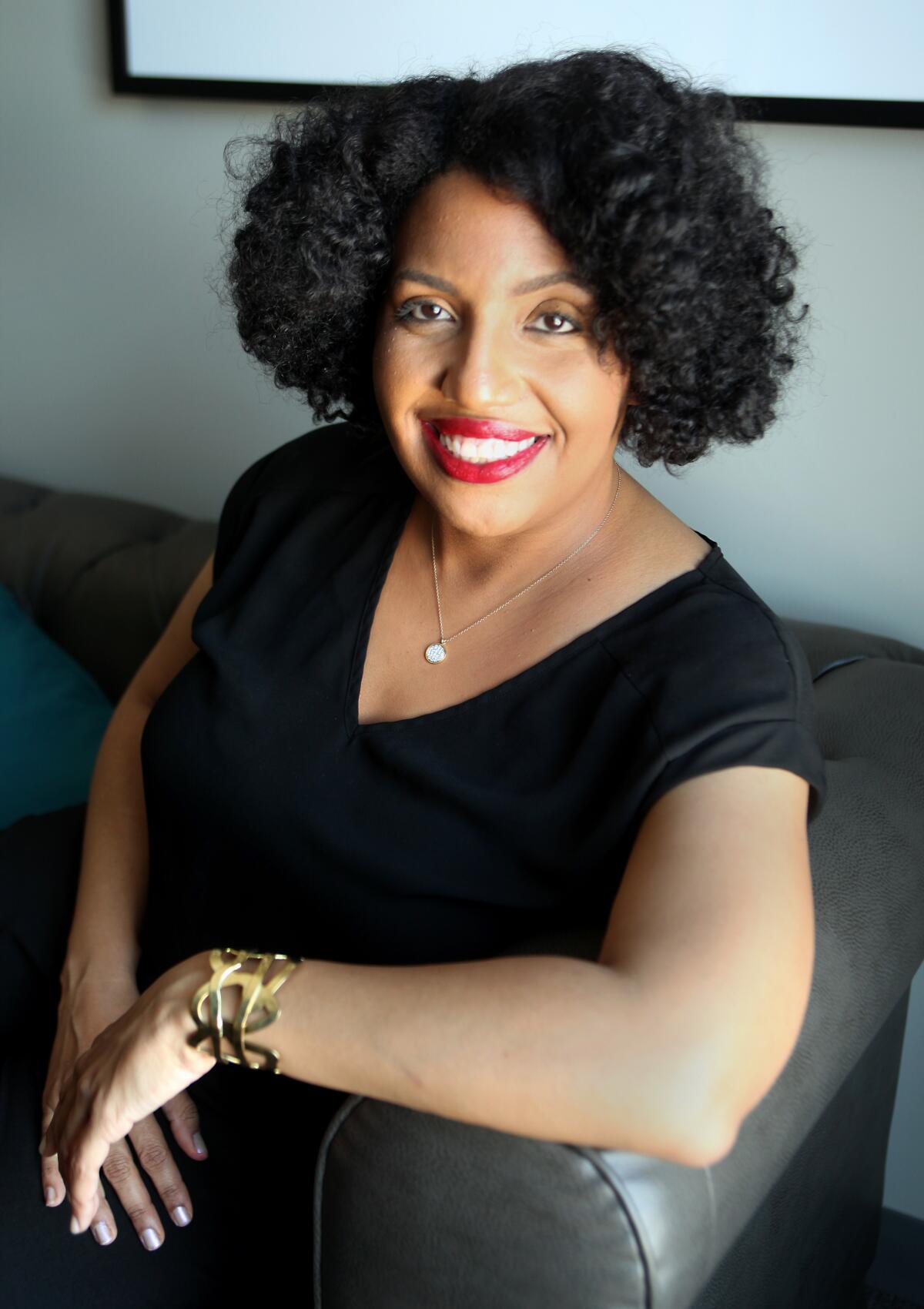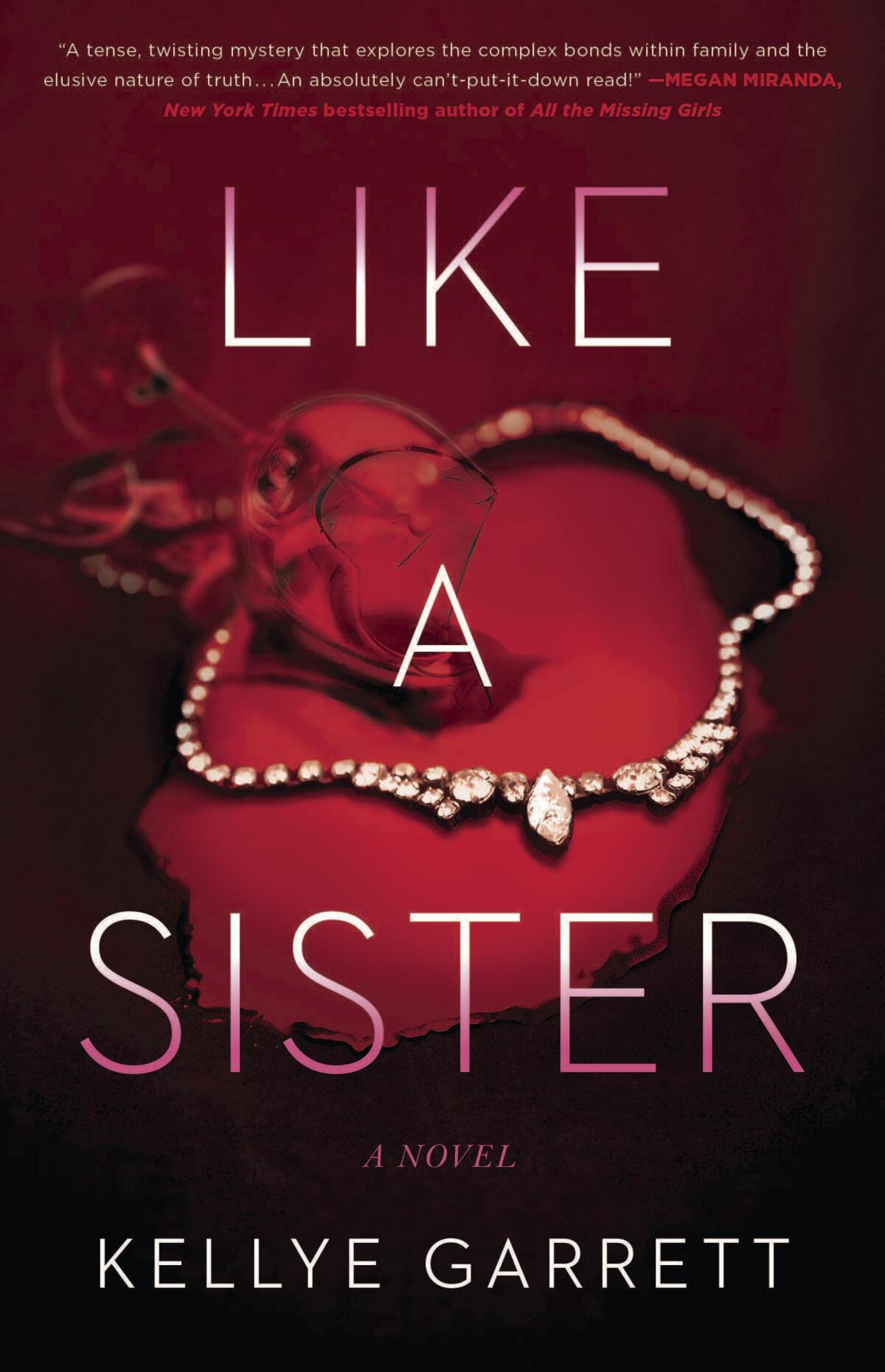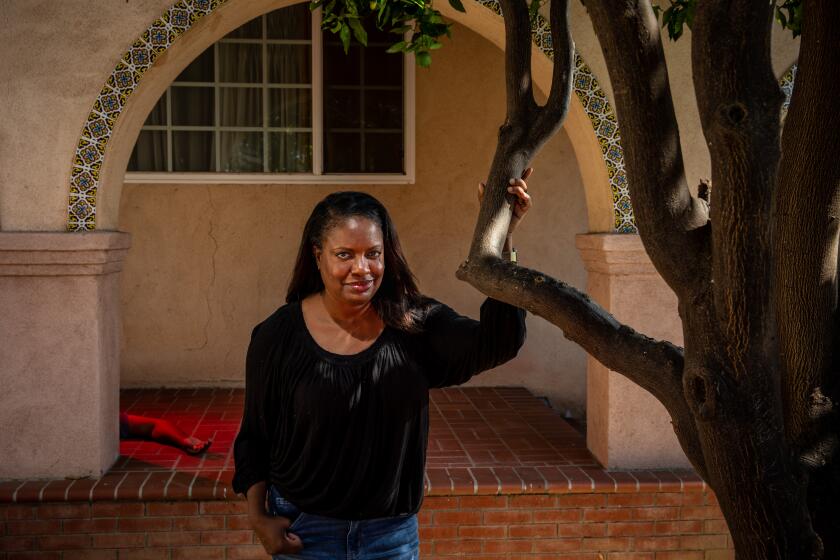How a Black mystery writer made room for herself and her breakthrough novel

- Share via
On the Shelf
Like a Sister
By Kellye Garrett
Mulholland: 320 pages, $28
If you buy books linked on our site, The Times may earn a commission from Bookshop.org, whose fees support independent bookstores.
The mystery writer Kellye Garrett is impressive on paper and, in conversation, a force of nature. A leader and a mentor among crime novelists, she gives off the unmistakable aura of having it together. But as she confessed over video interviews and email in the weeks leading up to publication, she’s a little nervous about her third novel.
“Like a Sister,” out this week, features Columbia University grad school student Lena Scott, who’s obsessed with investigating the death of her estranged half-sister, a blogger and former reality star in the Bronx. The media dismisses it as a drug overdose, but Lena knows better.
The novel represents a level-up for the New Jersey native and USC alum, the culmination of two decades of writing and a lifetime of experience. Set against a backdrop of hip-hop royalty, reality TV rejects and social media stalkers, her first stand-alone mystery — after two books set in Hollywood — has already landed on several “best of” lists for 2022. But after years toiling in a publishing landscape that hasn’t always paid much attention to Black women, nothing feels like a sure thing.
Garrett’s early career involved a job at a New York City newspaper and a stint at Vibe magazine interviewing hip-hop artists and producers. Yearning to get closer to the creative process, she turned to writing screenplays in her spare time. “But I was always afraid to write books,” she admits, even though she had been writing stories — or least beginning them — since the age of 5. “I’d start a story, write it out, then I’d forget it and move to the next one.” It was a childhood habit that took her decades to break.
Part of the cure, “an expensive one,” was film school in Los Angeles, where she learned how to write dialogue that sings and to balance plot with character (both on full display in “Like a Sister”). After obtaining a master’s in writing for film and television from USC, she and a writing partner got into the writers room on the CBS drama “Cold Case.” But after a season, Garrett and her writing partner broke up, the “Cold Case” gig ended and, after some projects failed to launch, she was left wondering whether to seek out more TV work or make a change.
Rachel Howzell Hall’s new novel, “And Now She’s Gone,” breaks the crime-fiction mold; its success proves a long line of publishers wrong.
“It was the end of 2011, and I had an idea for a novel,” she remembers. Family health troubles drew her back to New Jersey, where — between her day job in communications and her residual writer’s anxiety — it took three years to finish a manuscript. Crucial to her process was the recently disbanded nonprofit Pitch Wars, where unagented writers were paired with published mentors who helped polish their work for an agent showcase.
“Pitch Wars is the reason I value community so much,” Garrett says. “I met some of my closest friends through my time as both a mentee and mentor.” (Among her mentees were award-winning novelist Kristen Lepionka and cozy mystery writer Mia Manansala.) Garrett found her agent through the program and, two long years later, the publisher Midnight Ink picked up her debut, 2017’s “Hollywood Homicide.”

With writers like S.A. Cosby, Rachel Howzell Hall and Zakiya Dalila Harris earning acclaim and sales, it may be hard to fathom why Garrett had such trouble selling her series back then. But five years can make a world of difference. “The market is different now than it was in 2016,” Garret observes. “To be blunt, a lot of the bigger publishers weren’t checking for crime fiction books by and about people of color then.”
Her two novels in the Detective by Day series, which featured amateur sleuth and unemployed actress Dayna Anderson, were notable for their wicked humor, engaging characters and sharp observations about L.A. life. “Hollywood Homicide” won a fistful of awards; its sequel, “Hollywood Ending,” was well on its way to similar success when Midnight Ink closed its doors in 2018, just two months after the second book’s publication.
It was a shock for the generally upbeat writer, the beginning of what she calls a dark period. “There were times I wasn’t sure I was ever going to finish another book, much less get another book deal,” she says. But Garrett made the most of those years, building out the pipeline that had helped her along the way. She joined Walter Mosley and Gigi Pandian to establish Crime Writers of Color, an all-volunteer organization that’s now 350 members strong and boasts a speakers’ bureau and podcast — all in an effort to fill a glaring gap in the publishing landscape.
Five reviewers of crime fiction recap dominant trends in 2021, including a profusion of diverse narratives, genre crossovers and, of course, true crime.
“I had heard about that great period in the 1990s for Black crime writers, when Eleanor Taylor Bland brought so many writers together. But, from what I understand, after she passed away, it seems like that community disappeared a bit.”
And of course, she kept writing. In July 2020, “Like a Sister” was sold as part of a two-book, six-figure deal with Little Brown’s Mulholland imprint. While Garrett won’t draw a direct line from her advocacy to her success, she does think the climate has improved in the aftermath of our national reckoning with race. “There’s been a concerted effort to publish more diverse voices,” she says. “As a reader, it makes me excited because it means more amazing stories for me to read. As a writer, it makes me excited but also nervous, because I don’t want this to be seen as a trend. It needs to be status quo.”
While “Like a Sister” shares some DNA with the earlier mysteries, including a relatable heroine and a somewhat subdued sense of humor, Garrett’s first standa-lone strikes a more somber tone. Inspired by the real-life death of a film director’s daughter in 2018, the novel explores the intricacies of strained family relationships stemming from Lena’s absentee-father music executive. The gap between media personae and private lives is a running theme, allowing for an exposé of how fame is constructed in the era of “finsta” accounts and personal brands.
But this is no standard tabloid thriller. One of the most powerful moments in the book comes when Lena imagines herself donning a Super Black Woman cape to cope with her grief. “Unlike the Angry Black Woman label so many tried to make us wear,” Garret writes. “Strong or Super Black Woman was one we often gave ourselves,” even when the world failed to provide protection. “I don’t know if it was always a good thing, but it was most certainly our thing, passed down by both nurture and nature from generation to generation like a recipe for sweet potato pie.”
Garrett has donned that cape herself to cope with illness and death in her own close-knit family. “People don’t see Black women as vulnerable, but we are,” she says. “And I’m trying to embrace that more in myself.”
Perhaps that accounts for the ease in which she admits to pre-publication jitters. But after witnessing her in action and spending time immersed in her briskly plotted, socially astute new thriller, it’s clear Garrett has nothing to worry about.
Woods is a book critic, editor and author of the “Charlotte Justice” mystery series.
More to Read
Sign up for our Book Club newsletter
Get the latest news, events and more from the Los Angeles Times Book Club, and help us get L.A. reading and talking.
You may occasionally receive promotional content from the Los Angeles Times.










